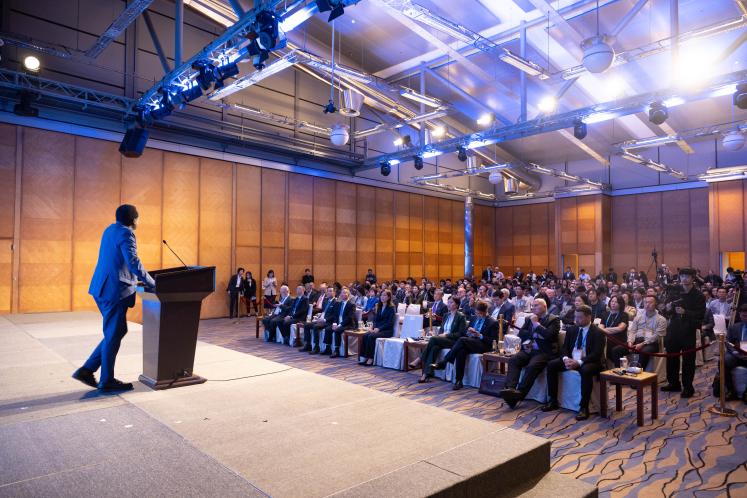- The UNU Macau AI Conference 2024 offered a unique opportunity to convene the Global North and the Global South, as well as the cultural East and West. This Conference is also UNU’s Contribution to the United Nations Summit of the Future in 2024.
- Nearly 500 participants from governments, business, academia and civil society from more than 30 countries, including 30 Ministers of ICTs and senior officials from 20 countries, participated in the meeting and connected across diverse viewpoints on the AI.
- The conference convened under the theme AI for All: Bridging Divides, Building a Sustainable Future, featuring 26 sessions in 3 thematic tracks.
- The plenary session launched the UNU Policy Guideline: Recommendations on the Use of Synthetic Data to Train AI Models.
- The UNU Global AI Network was officially launched under the witness of over 30 members.
UNU Macau AI Conference 2024 took place in Macau SAR, China on April 25. Close to 500 representatives from the academic community, policy-makers, private sectors, international organizations and civil society organizations from around the world came together for this conference under the theme AI for All: Bridging Divides, Building a Sustainable Future.
26 sessions and 4 side events took place over the course of one week, facilitating dialogue, discussion and exchange across 3 main thematic pillars: AI to Accelerate SDGs, AI Governance for the Future, and AI and Capacity Building.
The UNU Global AI Network was officially launched at the UNU Macau AI Conference, embodying a collaborative initiative spearheaded by the United Nations University (UNU) alongside its partners.
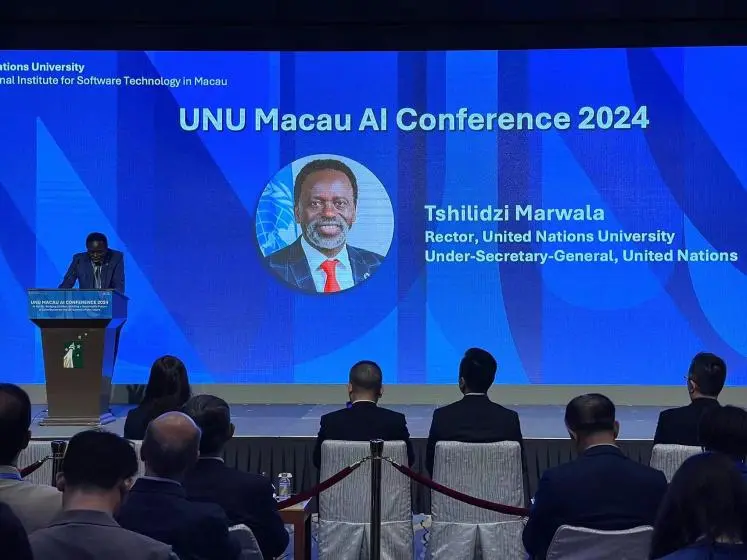
“AI is complex because it is how we are attempting to grapple with a planet in its full intricacy, and to solve some of the biggest problems of all time.” said Tshilidzi Marwala, Rector of the United Nations University, Under-Secretary-General of the United Nations. “The next milestone in this story is the Summit of the Future”.
A High-level International Gathering on AI
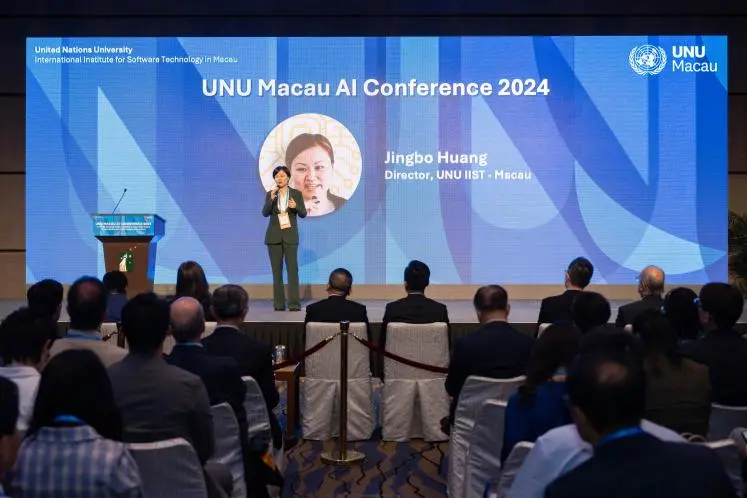
“It is the first AI conference hosted by UNU in Macau”, noted Dr. Jingbo Huang, director of UNU IIST Macau, in her welcome speech.
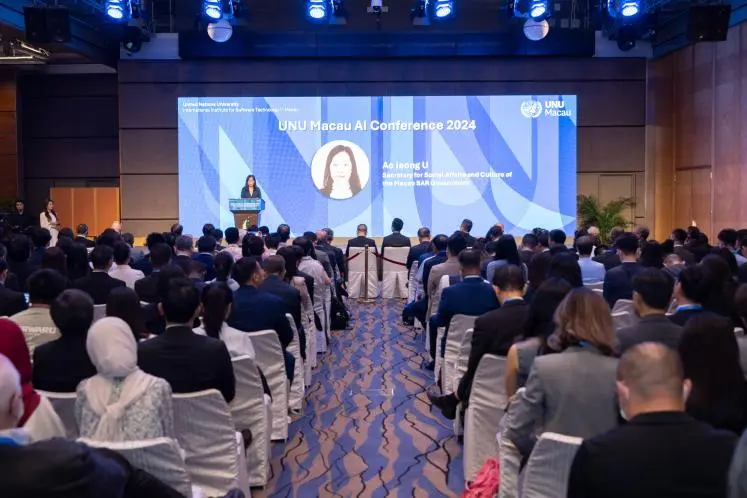
Ms. Ao Ieong U, Secretary for Social Affairs and Culture, representing the Chief Executive of Macao SAR Government, gave opening remarks and congratulated the opening of the conference.
H.E. Mr. Neang Mao, Under Secretary of State, Ministry of Post and Telecommunications of Cambodia, in his opening shared the experience from Cambodia and commended the efforts of UNU Macau to provide scholarships to youth from the Global South to participate in the conference.
“Ensuring the interoperability of governance initiatives, addressing the digital divide, and fostering a multi-stakeholder approach will be essential for realizing the full potential of AI”, said Dr. Amandeep Singh-Gill, the Secretary-General's Envoy on Technology and Under-Secretary-General of the United Nations.
Mr. Guy Bernard Ryder, Under-Secretary-General for Policy of the United Nations, congratulated the launch of the UNU AI Network, noting that “it has the potential to bring together experts from many sectors to discuss issues and challenges related to AI and to develop solutions.”
Prof. Tshilidzi Marwala, Rector of UNU and Under-Secretary-General of the United Nations, gave a keynote speech on AI and its relation to the Sustainable Development Goals: “It’s time to ask the biggest questions, and to bring AI home to the material essentials of sustainable development.”
Prof. Xue Lan, Dean of Schwarzman College and Dean of Institute for AI International Governance, Tsinghua University, gave a keynote on China’s development and governance, and lessons learnt.
The plenary session launched the UNU Policy Guideline: Recommendations on the Use of Synthetic Data to Train AI Models.
A further group of over 120 speakers from leading tech companies, academia, and civil society presented at the conference. Some of the speakers include Professor Joseph Hun-Wei Lee, President and Chair Professor Macau University of Science and Technology, Professor Ji Weidong, Chair Professor and President of China Institute for Socio-Legal Studies of Shanghai Jiao Tong University, Peter Knees, the UNESCO Chair of Digital Humanism from Technical University Vienna, Yanhui Geng, the director of Huawei Hong Kong Research Centre.
The conference also hosted a high-level international delegation of participants made up of 30 ICT ministers and senior officials from Global South including Bangladesh, Bhutan, Cambodia, Egypt, Ethiopia, Fiji, Gambia, Lao PDR, Mexico, Mongolia, Morocco, Rwanda, Samoa, Sierra Leone, Tanzania, and Vanuatu. the United Nations Department of Economic and Social Affairs (UN DESA) and UNU Macau hosted the first side event, a workshop on data governance and digital transformation, for the delegates.
The Launch of the UNU Global AI Network
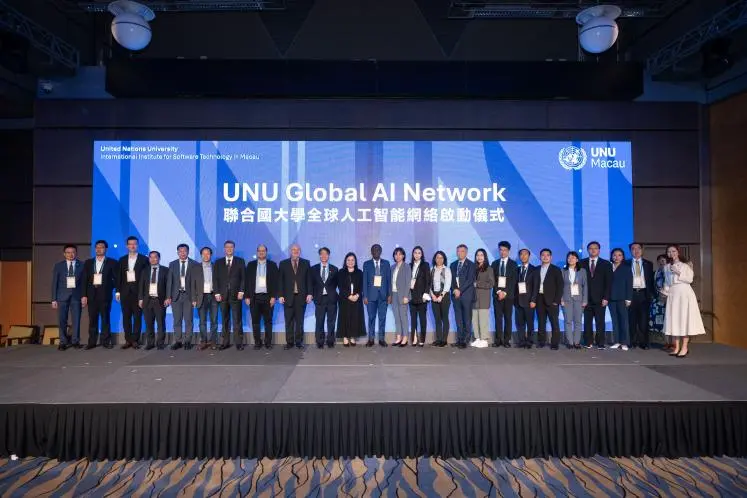
The UNU AI Network embodies a collaborative initiative spearheaded by the UNU alongside its partners. This network is envisioned as a comprehensive global platform, uniting the expertise of academia, the innovation of the private sector, the foresight of policymakers, and the grassroots engagement of civil society.
The network was officially launched at the UNU Macau AI Conference on April 25. The launching ceremony went under the witness of over 30 network members including Federal Ministry Republic of Austria, Ministry of Post and Telecommunication of Cambodia, Macau University of Science and Technology, Institute for AI International Governance of Tsinghua University, Norwegian University of Science and Technology, African Society in Digital Sciences, Chunlai Education, MGM, Tencent, Sensetime, and Venture Cup China.
“The UNU AI Network aims to connect AI experts from industry, academia, policy-making bodies, and NGOs worldwide. It will serve as a dynamic platform for sharing AI knowledge and insights, thereby enhancing the application of AI technologies in promoting sustainable development and achieving the Sustainable Development Goals of the United Nations,” remarked Prof. Tshilidzi Marwala, Rector of UNU and Under-Secretary-General of the United Nations, at the launching ceremony.
As one of the founding members of the Network, Tencent remarks that under the concept of "Tech for Good," Tencent places great emphasis on responsible AI. Not only does it propose and implement the four AI ethical principles — being available, reliable, comprehensible, and controllable — but it also actively explores using AI technology to serve people, contributing to the innovation of social values and supporting the Sustainable Development Goals.
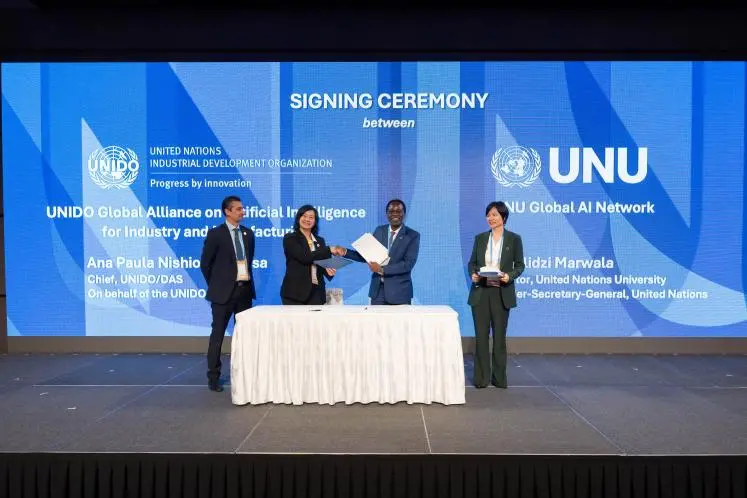
A collaboration pledge was signed between the UNIDO Global Alliance on Artificial Intelligence for Industry and Manufacturing and the UNU Global AI Network during the launching ceremony.
Achieving AI for All
26 sessions and 4 side events took place over the course of one week, facilitating dialogue, discussion and exchange across 3 main thematic pillars: AI to Accelerate SDGs, AI Governance for the Future, and AI and Capacity Building.
AI to Accelerate SDGs
This track explores what AI can do to accelerate the achievement of SDGs. Sessions in this track included AI Agents in Practice: Harnessing AI for All; Integrating Artificial Intelligence with Complex Systems Modelling to Achieve the SDGs; Integrating Data to Ensure Inclusive Education of Climate Change Displaced Population and more.
AI Governance for the Future
This track examines the complex issues related to the ecosystem and governance of AI. Sessions in this track included: Digital Humanism - an Approach to Master the Global Challenges of Tech Power; Gen-AI Governance and Law in the Asia-Pacific Region; A Gender Equality Perspective on Responsible AI and more.
AI and Capacity Building
This track deals with ways to harness the full potential of AI by building the capacity of individuals, organizations and societies, to understand, create and use AI effectively and responsibly. Sessions in this track included AI, Peace Building, and Digital Inclusion; Citizen Science, Participation and AI; AI Media, Communication, and Education and more.
Side Events
AIM Global: AI for Sustainable Development Goals in Industry and Manufacturing. A special AIM side event was held at the Conference. With speakers from different UN bodies, governments, leading tech firms and academia, the event provided a platform for discussion on the transformative potential of AI in different sectors.
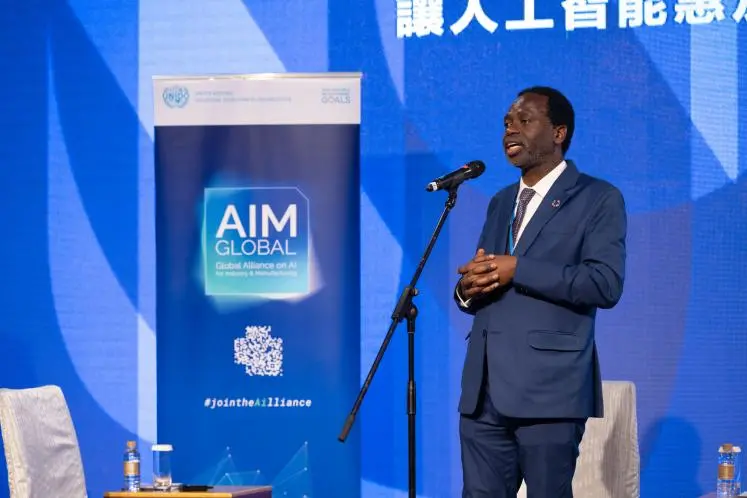
The side-event started with a keynote speech by Prof. Tshilidzi Marwala, Rector of United Nations University and Under-Secretary-General of the United Nations. He noted that “Global collaboration, such as the partnership between the UNU Global AI Network and the UNIDO initiative AIM Global, is essential for promoting knowledge and resource sharing to scale up AI implementation.”
Dr. Gerd Müller, Director General of UNIDO, pointed out in his video message that “AI is revolutionizing the industry, boosting productivity and paving the way for sustainable practices.” and “At UNIDO, we're leading the charge to integrate AI in the industry for a sustainable future.”
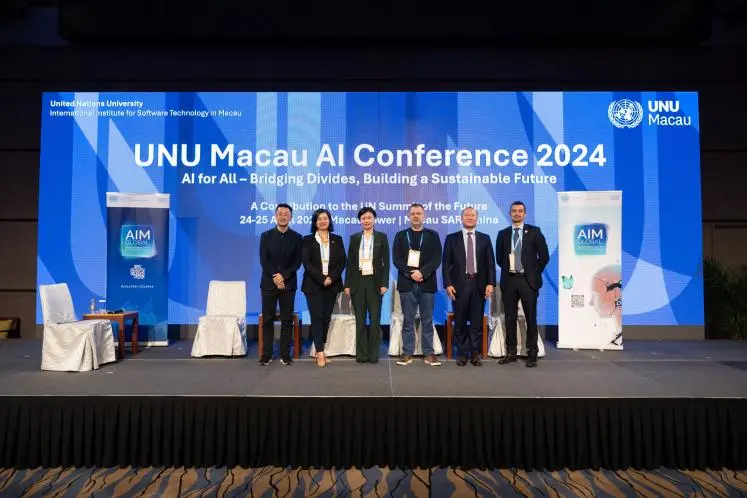
Speaker of the event, Dr. Yanhui Geng, director of Huawei Hong Kong Research Centre also highlighted how Huawei is keen to implement AI for development in industry and manufacturing, “We are actively exploring various applications of industrial-level AI technology in the field of smart manufacturing. We are committed to enhancing production efficiency and driving industry progress through technological innovation, bringing about continuous transformation and development for the entire manufacturing sector.”
The Global Forum on Data Governance and Digital Transformation is organized by the United Nations Department of Economic and Social Affairs (UN DESA), and features a delegation of 30 ICT ministers and senior officials from the Global South.
Pre-Summit of the Future Dialogue on Artificial Intelligence and Digital Technology is one of four pre-Summit of the Future Events organized by the United Nations in China, aimed at facilitating a sustained multi-stakeholder dialogue and cooperation in the digital world.
ICTP-UNU Workshop on TinyML for Sustainable Development. In the course of 5 days, this workshop focuses on applications of TinyML that are particularly relevant to Asian researchers and provides hands-on training on commercially available hardware.
The UNU Macau AI Conference 2024 would like to express special thanks to China Chunlai Education Group, Huawei Technologies Co., Ltd., MGM, Tencent, Venture Cup China, the Consulate General of France in Hong Kong and Macau, the Federal Ministry for European and International Affairs, Republic of Austria.

